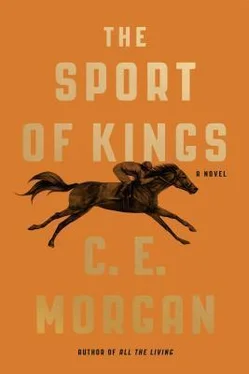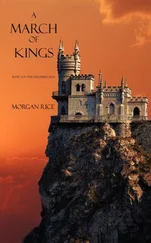“Whose baby is that?” she inquired.
But Henry didn’t hear. His dilated pupils took in too much light; it caused everything to grow distorted and overbright. “You talked to my daughter,” he said to Lou. “You talked to her the day she died.”
Lou’s gaze was steady, level. “Yes, I did. She came to see me, and we talked for a good while. I often think of you and your grandson and wonder how you’re doing. I’m sure it’s been very hard for you over at the farm. I’ve been over a few times, but never—”
Her compassion was Confederate money. “Tell me what you said to her that day.”
“What I said?” Lou’s eyes assumed a distant look and her lower lip pressed out slightly as she turned her mind back to that autumn day. “She had come to see me, kind of a surprise visit.”
“What did she come to see you about? I need to know.”
Lou looked pensively at the ground as her daughter bumped gently, rhythmically against her side. Then Lou stopped the girl by holding her shoulders with both hands and, looking up with the light of remembrance on her face, said, “I had mentioned to her once that the horse was the remnant of an evolutionary failure, and she wanted to know what I meant by that. We talked for a while about the pregnancy and—”
“An evolutionary failure?”
“Well, yes,” Lou said, clearing her throat. “It’s really the first thing you learn when you study evolution in school, that Equidae was an empire — a huge family — in the animal kingdom, but most of its branches disappeared and its descendants died out until all that was left was equus: the horse, ass, the zebra, the—”
“Evolution is a ladder,” whispered Henry, “a ladder to a perfect thing.”
“Actually, no, not really.” Lou shook her head quizzically, so her hair fell lopsided out of its graying bun. “It’s not a ladder. It’s more like … a bush.” She raised her hands to mold a fulsome round in the empty air. “Think of it as a branching bush. A great, endlessly diversifying bush that gets stronger with each new branch, each new variation.”
Henry stared at her without moving a muscle. Samuel chirped near his ear, slowly waking from his sleep. Henry’s mind was filled with the memory of Henrietta, his child, his responsibility. His eyes filled with tears.
Then Lou said suddenly, as if his gaze were a question to be answered, “Henry, you should know that it was not a — a heavy day. I mean, I remember Henrietta laughing. And she seemed very ready for birth.”
“Henry!”
Henry’s head snapped round in the direction of the voice, a man calling for him in the midst of the crowd. “Henry Forge!”
“Where is he?” Henry said.
“Who? Henry?” Lou reached for him with one hand.
But Henry was already moving away, his body an automaton maneuvering his spirit through the crowd. Samuel wriggled, reaching up with one hand for Henry’s right ear. His grandfather’s ears were his favorite new toys.
“Henry!” Yes, he knew that voice — knew it like he knew the inside of his own mouth. He was peering around all the Derby hats, their absurd heights and ostentation impeding his clear view.
“Henry!” The voice was insistent, implacable, eternal.
And there he was, a shadow in the crowd.
Henry reared back suddenly, wanting to reverse course and disappear.
No, Father, my lessons are over and done.
Tell me, Henry, is man the measure of all things?
Father, I don’t want to play this game anymore — I can’t!
I am the pruner and you are the vine.
No, you are the tyrant!
Henry, you don’t understand—
That’s where you’re wrong, Father! I do understand! Man may be the measure of all things, but no single man can be, because there’s no such thing as a single man. Now I know you cannot kill a tyrant — he wrapped his arms tightly around Samuel — because the man who kills a tyrant becomes a killer and a tyrant. And that, Father, is why they call it the wheel.
* * *
Henry stands in the crowd, utterly still and sure. He finally knows what he is going to do, what has been rising in him like water set to burst its dam; surety overflows. He will pull Hellsmouth from the Derby and end it right here, right now. There are no bodies, only beings. That truth is the child in his arms, whom he will reveal to Allmon. The truth will not roll back time, but it will make the future. He turns around and begins to run with Samuel in his arms. He finds no argument in his heart.
* * *
But it’s too late. Reuben has already swung up onto Hell’s saddle, his hands like money clips on the reins. The sky begins to churn and drum with approaching thunder.
Henry cries, This is my Regret!
Allmon’s stomach is in his throat as he leads the fearless filly through the tunnel and out onto the churned turf. When he lets go of the shank, the eyes of the crowd pass from him. As if he doesn’t exist.
The Reverend says, Who shall uphold the cause of the needy? When shall the fatherless say Amen?
By the time Henry reaches the grandstand, when he finds a sightline, it’s too late. Hellsmouth is nearly through the post parade with a palomino pony at her head and a vulture on her back.
The horses are in the gate.
The starting gun is cocked.
Wait, wait, stop their mouths and still their minds. Unseat the jocks, unsaddle the mounts, loosen the shanks, rewind the walkers. Once again and with care: In the green paddock stand the glossy blacks, bays, grays, and roans. In the bright and bustling paddock, it’s May. Circling, the horses nod and pass, nod and pass. Listen closely and every sound is sovereign in its kingdom, the chains clinking, saddles creaking like winches, hooves knocking dully at the door of eternity, cries of hup!hup!hup!
The bright silk jocks are cardinals, jays, purple martins, blackbirds. Process, progress, mercenary plumage along the gray brick walk. Firing hearts scatter buckshot beats to delicate wrists, behind emaciated knees, along bony insteps. The youngest jock leans over the embankment of his horse and vomits into the dirt as they pass through the tunnel. On its axis, the grandstand tilts and the bettors tumble to the fore of the house — gripping the rails and vying for a view of the beasts as they emerge.
The horses pass along the gate like lanterns shining, lanterns that bathe the watcher as they pass one by one, dark lanterns swaying on their chains housing bold, interminable light; bright, brief lanterns in a round processing, swaying, passing one by one into the damping gate.
Motionless and massive, they stand.
Suddenly the bell rings, the gates are sprung, the sky hurls invective rain, and the horses unfurl their colors before the crowd. They move through the gray veil of rain, gathering speed, charging on brittle bones, swinging as a single body around the track, shod hooves spattering mud. The mud is inside of everywhere — mud slung under saddles, in the eyes of the horses, caking the goggles of the jocks, which are stripped again and again and again. The wind whips the group from behind, pressing them to greater speeds but in the downpour, so they run sloppily, jostling and bumping and sliding, crossing the track with their lungs bursting and their nostrils bloody. When one horse begins to pull away, it’s colorless from the mud, as if the earth itself has risen up and begun to run, and the crowd can’t tell which it is. With each amplifying stride, it drives free from the pack, first its nose, then its withers, its rippling quarters. The animal accelerates without seeming to labor, as if the agony of racing were nothing but a game. Now the crowd rises without knowing which horse it rises for, each indistinguishable from the other. One length becomes five becomes eleven becomes sixteen. The crowd is screaming in abandon with arms raised; their faces are glazed with rain, their hats are ruined. They’re roaring for the anonymous gladiator as it crosses under the wire at twenty lengths, all four hooves free from the ground, its tail streaming behind it like a muddy flag. Now the field follows in a brown bundle, and the first horse is hauled up to a gallop, the jock standing in the irons. It’s Reuben Bedford Walker III pummeling the sky with his fists, while under him Hellsmouth spins like a weathervane, wet earth fanning out from under her hooves like seeds from a sower’s hand.
Читать дальше
Конец ознакомительного отрывка
Купить книгу












